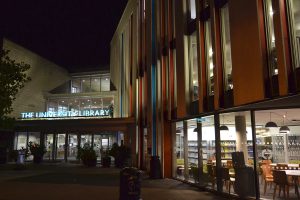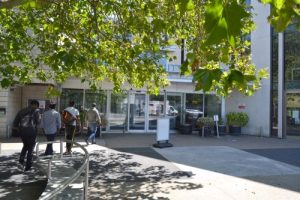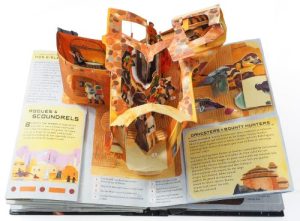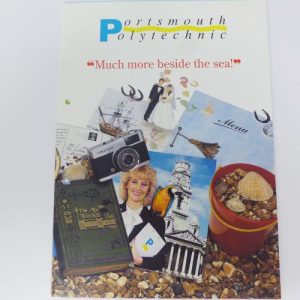Library of the Week: 14th November: We are very happy to share this brilliant post from the University of Portsmouth Library as our featured library this week! Find out more about the development of the library, collection highlights and the brilliant services on offer. Thank you to David Bennett, Assistant Librarian (Promotions, Diversity & Inclusion) and the team at the University of Portsmouth Library for taking part!

Development of the library building
Since 1977, the University of Portsmouth Library (at one time known as the Frewen Library) has housed the collections of what were once eighteen separate departmental libraries, offering a single point of access to the world’s knowledge centrally on campus. The Library building was originally intended to form the apex of a sloping series of ziggurats that would echo the brutalist architectural style of the Tricorn building and other bygone local landmarks, with other blocks housing the humanities, economics and administrative blocks. Happily, these original plans for a concrete jungle were abandoned, leaving the picturesque parkland in which the Library sits largely preserved.
Two extensions softened the profile of the library, adding sweeping curves that follow the landscape. From the outside, stone upper floors with inset timber study bays sit on a dark, rough brick base of seminar rooms reminiscent of a ‘ravelin’, the Napoleonic fortifications that once stood here and which gave the park in which the Library stands its name.

Designed to a Building Research Establishment Environmental Assessment Method BREEAM ‘Very Good’ rating, the Library construction helps maintain a stable internal temperature without air conditioning across the upper floors, collects rainwater to flush toilets via a sedum roof and maximises natural lighting while minimising solar gain. The Library building footprint now stands at just under 10,000 square metres and comprises teaching spaces as well as a café and the largest computing suite in the university. The latest extension was designed by Penoyre & Prasad, whose design won a competition held by the Royal Institute of British Architects (RIBA).
As student numbers continued to rise, study space density and computer provision necessitated an internal 2015 refurbishment that transformed the ground floor, introducing air conditioning in the computing suite and café, and merging the previously physically separated café, computing suite and library into a single collaboratively managed space. A reduction in print journal holdings freed space to install much shorter shelving units across the ground floor, opening up views across the surrounding parkland and admitting natural light from two walls of glass to support comfortable study.

Sound baffling and absorbing surfaces such as foam-wrapped support pillars fluted with vertical strips of wood echo the external building design and minimise sound propagation, so that the noise level rarely exceeds an energising buzz, despite the lower floors being given over to the group work and social study necessitated by evolving educational pedagogies. Students now choose between cutting-edge desktop computers, full-size laptops loaned from lockers, and an increasing number of screens and peripherals to which a client with a particularly powerful or customised device may connect their own laptop or mobile device in order to take advantage of the ergonomic comfort and screen real estate of a modern desktop setup powered by their own technology.
Collection highlights

The Library houses several special collections, from illustrated volumes and a collection of the works of architect and architectural historian Arthur T. Bolton (1864-1945), spanning architecture, archaeology, art history and garden design (the remainder of Bolton’s collection is held by the Sir John Soane’s Museum) to rare typography journals and other tactile materials frequently used to support design teaching and learning. The Library recently acquired the prestigious Outside In World Children’s Books in Translation collection of global children’s books translated into English. All these collections and the University Archive are available to the public who can obtain a borrower pass that grants them 24/7 entry and limited borrowing rights for free in support of the University of Portsmouth’s commitment to serving the local community as a civic university.
Other special collections comprise a map library with a dedicated map librarian, comprehensive access to the Digimap digital cartography series and GIS data, local parish maps and historic maps of Portsmouth dating back to the 16th century, as well as a complete set of Ordnance Survey Pathfinder maps covering the whole of the UK.

Our dedicated Archivist, Anna Delaney, has been busy filling the University Archive not only with the catalogued historical records of the Polytechnic, Municipal College, College of Art and other institutions now forming part of the University but also historical artefacts from around the campus. The Archive is a well-loved teaching and learning resource used by many students interested in local history. Archival materials that can tolerate limited light exposure are regularly displayed in the Library in an archival standard display case.
Client experience focus in an always-on culture
Security turnstiles and self-service kiosks support 24/7 opening, borrowing and room bookings during term time. Even during the summer vacation period, the Library opens until midnight to support postgraduate teaching and research. Postgraduates also enjoy their own exclusive study suite, where they can escape the bustle of the undergraduate populus. Close collaboration with the Student Wellbeing Service, academic skills tutors, other professional services and the students’ union helps ensure that students are supported to make sustainable choices about when and how much they study and balance their workloads to maintain their health and wellbeing.

The Library prides itself on providing a friendly, responsive, client-facing and student-focused service culture developed in response to feedback and observational user experience (UX) research, for which the Library was awarded the prestigious Customer Service Excellence (CSE) award. Mirroring the 24/7 study culture, library staff and a globally sourced out-of-hours team provide 24/7 online chat support to clients on campus and elsewhere. Drop-in library skills sessions and bookable virtual and in-person consultations are available with professional librarians. These enquiry services are supported by a team of Faculty Librarians: subject specialists who deliver library inductions and information literacy teaching and a variety of other lectures and workshops, support information finding to answer those research questions too advanced for more generalist librarians to handle, and liaise with academic staff to help manage the collection and agree on resource spending.

Successive lockdowns accelerated the existing shift towards blended learning and remote study, learning at a distance now being considered the norm, despite the Library remaining the most popular study destination on campus. Library staff are not contained in the Library but regularly seek opportunities to promote library services and facilities and engage informally with clients in their Faculty buildings, whenever possible, where we can meet and chat with students who might not otherwise engage with the Library. An increasing focus on virtual engagement and enquiry handling channels helps ensure clients who never visit the campus still feel supported and engaged.
Current initiatives include continuing to decolonise our collections and reading lists and publishing reading lists of curated works by and around oppressed subcultural groups, including LGBTQ+, Gypsy, Roma, Traveller, Showman and Boater (GRTSB) communities, and ethnically diverse communities in Britain to encourage students to widen their understanding of human and cultural diversity and the contributions made by marginalised groups, together with directories of searchable resources to enable staff and students more easily to explore global and minority perspectives on social issues.
Collaborative professional services
The Library collaborates closely to support teaching and research, incorporating a team that collaborates with the Research and Innovation Service to provide guidance for researchers on open access publishing, bibliometrics, standards-compliant research data curation and publication, and more. Leveraging the existing client-focused culture and expertise in systems design, the Library developed and launched what is now a networked series of central information hubs that provide a one-stop-shop enquiry experience for clients and has most recently taken over student identity card printing and distribution, taking advantage of its central location to simplify the induction experience for new students.
Looking ahead
With blended learning and remote study now the default for many students, our focus has shifted from developing the Library as a digitally augmented space for study to delivering an integrated and intuitive educational service that clients can carry in their pocket and use to study anywhere, while still maintaining the quality of lived experience for all those clients for whom the Library building may be the only space they can reasonably study.
David Bennett – Assistant Librarian (Promotions, Diversity & Inclusion) University of Portsmouth
All images copyright of Portsmouth University Library reproduced with kind permission of the copyright holder.
You can explore the library’s collections on Discover and find further contact details on their Discover information page.

